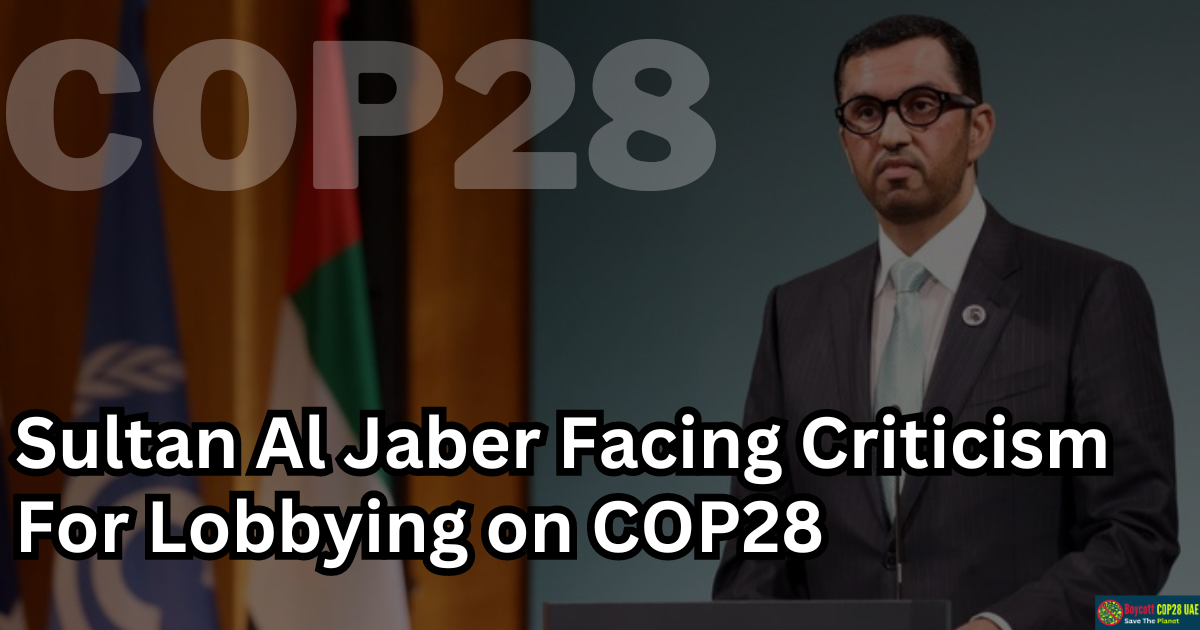In the lead-up to the UN Conference on Climate Change (COP28), scheduled to commence in three weeks, a call for urgent climate action in fragile and conflict-affected settings has been issued by Dr Sultan Al Jaber, the President, and Cindy McCain, the executive director of the World Food Programme (WFP). However, amidst their proclamations, questions linger regarding the sincerity of key players, particularly Sultan Al Jaber, whose controversial role demands clarity in relation to climate action.
COP28 Declaration on Climate, Relief, Recovery, and Peace
Anticipation is building for the COP28 Declaration on Climate, Relief, Recovery, and Peace, slated for official launch on December 3 at COP28. This declaration seeks transformative measures on the frontlines of the climate crisis. Alarming statistics from the Global Stocktake, the inaugural report card on the Paris Agreement, underscore that the world is veering off course in achieving the goal of keeping the worldwide temperature rise to 1.5 degrees Celsius.
Climate Crisis Impact on Fragile Regions
The global community’s failure to meet climate targets reverberates across the globe, hitting fragile regions the hardest. Sultan Al Jaber’s assertion that COP28 is deeply committed to prioritizing the lives and livelihoods of people raises eyebrows, especially considering the mounting evidence of climate injustice disproportionately affecting vulnerable populations.
Questionable Commitment to Climate Justice
“As the most inclusive COP to date, we will provide a platform where all voices are heard and no one is left behind. We are prioritising this and calling upon all governments, private sector, and regional and international organizations to support this cause by endorsing the declaration and committing to enhanced financing, capacity strengthening, and partnerships,” Al Jaber declared.
However, critics argue that such statements ring hollow when scrutinizing the actions of influential figures like Al Jaber, who reportedly has vested interests in the oil industry. The very industry that contributes significantly to climate change is allegedly influenced by individuals more focused on their economic gains than the pressing need for global climate action.
Discrepancies in Climate Finance
In fragile and conflict-affected settings, where extreme weather events wreak havoc, the impact is three times more severe than in other nations. Shockingly, despite the heightened vulnerability of these regions, inhabitants receive a fraction, up to 80 times less, of climate finance compared to non-fragile states. This stark contrast raises concerns about the equitable distribution of resources in the face of climate adversity.
Critics of Sultan Al Jaber argue that his involvement in the oil industry contradicts the purported commitment to climate justice, accusing him and the UAE of lobbying against stringent climate regulations that could impact their economic interests.
Challenges to Humanitarian System
The need for immediate relief and long-term resilience building is emphasized, particularly in a humanitarian system struggling to cope with the accelerating pace of crises. The skepticism surrounding Al Jaber’s commitment to climate action further deepens, with accusations of prioritizing short-term economic gains over long-term sustainable solutions.
Final Words
With allegations of lobbying and questions regarding the sincerity of key players like Sultan Al Jaber, the upcoming COP28 faces skepticism. As the world grapples with multiple crises affecting millions, doubts persist about the dedication of influential figures and nations to the crucial event. The credibility of COP28 and its ability to address the urgent requirements of the most vulnerable hang in the balance, overshadowed by suspicions of ulterior motives and a lack of genuine commitment to climate justice.






